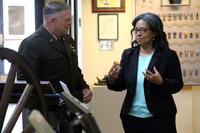Even general officers risk being captured or killed while at war. From the Revolutionary War to the war in Afghanistan, generals near the front have been subject to the same risks as any other troop on the battlefield. How they get captured might vary.
In the Revolutionary War, Gen. Charles Lee was captured while moving his army to meet Washington at Trenton. During World War II, Lt. Gen. Jonathan Wainwright surrendered the Army in the Philippines to prevent the wholesale slaughter of his men. In Korea, Army Maj. Gen. William F. Dean was determined he wouldn’t be taken alive.

Dean was the commander of the closest American ground forces to the Korean Peninsula when 200,000 North Korean troops invaded South Korea on June 25, 1950. Gen. Douglas MacArthur ordered Dean and his 15,000 troops to stop or delay the Communists until reinforcements could arrive.
By the time he arrived in Korea, Seoul already had fallen to the North Koreans and they were headed to Osan. Dean dispatched Task Force Smith to Osan to head off their advance, but it was full of inexperienced and lightly armed troops, straight from basic training. To make matters worse, the Americans had no weapon to counter North Korea’s Soviet-built T-34 tanks.
A series of quick defeats befell the defenders, but Dean kept trying to hold back the Communist forces. At Pyeongtaek, Chochiwon and Taejon, the Army’s 34th Infantry put up the best fight it could, but it quickly found itself overwhelmed.
Taejon was a critical stopping point for the Americans. In their rear, the United Nations forces were trying to build up the defenses around the tip of the peninsula’s southeast region, a 40-mile defensive line that would become known as “the Pusan Perimeter.” Dean needed to hold the city for eight days as the U.S. 1st Cavalry Division and 25th Infantry Division finished forming the defensive area.
Dean crossed the Kum River near Taejon on July 12, 1950, burning the bridges behind him. He kept the North Koreans out for seven days before they came in force. His headquarters were overrun by the Communists as the fighting descended into house-to-house combat. There were just too many enemy soldiers to fight.

Block by block, the Army was being pushed out of Taejon. They had no radio communication for Dean to coordinate its defense, so he joined his troops fighting in the streets, hunting tanks with a new weapon, the M20 Super Bazooka. He also destroyed an oncoming tank with a hand grenade and directed the movement and fire of American armor in the city.
On July 20, the day the Pusan Perimeter was supposed to be finished, Dean finally ordered what was left of the Americans to withdraw from Taejon. Maj. Gen. Dean led a company of soldiers to escort the last convoy out of the city. By the time it was ready to leave, the North Koreans had set up a series of roadblocks to stop the Americans from fighting their way out. But Dean still fought on.
When his convoy was ambushed and mostly destroyed, Dean led the survivors on foot, continuing their exodus from Taejon. Now in a Jeep, he sped on until he came across some U.S. soldiers who crashed their truck into a ditch. Dean stopped to help, but the North Koreans soon arrived and all were forced back. On foot once more, the wounded managed to escape, but Dean was separated.
In the mountains, the general fell down a deep slope and knocked himself unconscious. He awoke with a broken shoulder and bleeding from a wound on his head. He proceeded to wander in the wilderness for more than a month. He eventually was tricked into a North Korean ambush by two presumed South Koreans.
Even with all his injuries and losing 70 pounds while being lost, he drew his sidearm and fought the Communists, trying to force them to kill him. Back in the Pusan Perimeter, Dean was thought to be killed in action, but he was taken prisoner.
For the first part of his captivity, Dean was held in a POW camp like any other American prisoner as he tried to keep his identity (and his rank) a secret. When the Communists discovered who he was, he was moved to Pyongyang, where he was kept separate from other Americans.
Dean tried to kill himself in case the North Koreans tortured him for information. He had knowledge of the forthcoming Incheon Landing that the Americans were to make behind the North Korean advance, and he wasn’t sure he could keep the secret under torture.
Throughout all the swings in advantages throughout the war, from the Incheon Landing to the Chinese intervention, and the massive aerial bombardment of North Korea by the United Nations, Dean was held prisoner. He wouldn’t be repatriated until after the 1953 armistice was signed and all prisoners were exchanged.
For his defense of Taejon, he was awarded the Medal of Honor -- thought to be a posthumous award. His wife and children received it on his behalf from President Harry S. Truman in 1951 as Dean sat in a Pyongyang POW camp.
-- Blake Stilwell can be reached at blake.stilwell@military.com. He can also be found on Twitter @blakestilwell or on Facebook.
Want to Learn More About Military Life?
Whether you're thinking of joining the military, looking for post-military careers or keeping up with military life and benefits, Military.com has you covered. Subscribe to Military.com to have military news, updates and resources delivered directly to your inbox.















